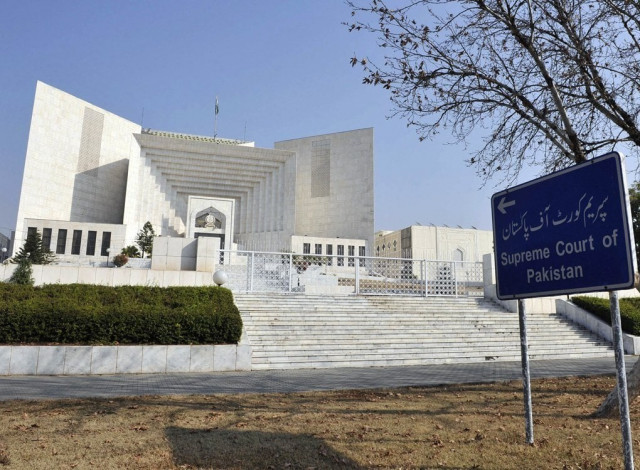Brazen disregard for law by K-P, ECP surprises SC
Says provincial govt, polls body disregarded both LG law and Constitution

The apex court has expressed surprise over “brazen disregard of the law” and the Constitution by the Khyber Pakhtunkhwa (K-P) chief minister and the Election Commission of Pakistan (ECP) as they have failed to conduct local government (LG) elections despite a delay of 14 months.
A division bench, led by Justice Qazi Faez Isa, has issued a four-page written order regarding implementation of its earlier judgment on the compliance of the Clauses 39 and 41 of the K-P Local Governments Act, 2013.
The order observed that the K-P province is bereft of elected LG representatives since August 28, 2019 when the term of the previous elected representatives came to an end.
"Therefore, Chapter V of the [K-P Local Governments] Act titled ‘Local Council Elections’, which comprises 47 sections, has been rendered redundant. We are surprised to note this brazen disregard of the law,” the order said.
The apex court said the LGs and LG election are also a requirement of the Constitution, which stipulates under 140A that each province shall establish a local government system and devolve political, administrative and financial responsibility and authority to the elected representatives of the LGs.
“Elections to the local governments shall be held by the ECP," the order cited the Constitution.
It noted that the responsibility of the Chief Election Commissioner (CEC) and the ECP which is a constitutional body is reiterated in Article 222(f) of the Constitution and also finds mention in the K-P LG Act. The court noted that to abide by the Constitution and the law is not optional but obligatory.
"All constitutional office holders before entering their offices take oath, including the CEC and the members of the ECP whose oath requires them to act ‘in accordance with the Constitution of the Islamic Republic of Pakistan and the law’.
“Unfortunately, neither they [ECP officials], the chief minister nor the members of the provincial cabinet are abiding by the Act and the Constitution as local government elections are not being held and the people continue to be deprived of democracy."
The court noted that grave violation of the LG act and the Constitution must be brought to an end and the act and the Constitution must be complied with.
The court ordered its office to send a copy of order to the CEC, the ECP members, the K-P chief minister and every member of the provincial cabinet to ensure compliance with the Local Government Act 2013 and constitutional provision about holding of election and establishment of LG system in the province.
"Notices be also sent to the learned Advocate-General, K-P and the learned Attorney-General for Pakistan to advise their respective governments to abide by the law and the Constitution and to stop depriving the people of their democratic right to elect their LG representatives," said the order.
The order also noted that they had directed the chief secretary and the LG Elections and Rural Development Department secretary to issue written instructions to the concerned to ensure compliance with Section 39 of the K-P Local Government Act, 2013.
It said the act mandates that annual reports be submitted disclosing particulars of the properties held during the preceding year; the total value of the property and its annual return; particulars of unserviceable articles and losses and plans for utilization, development and improvement in the following year.
"We had further directed that in case any pilferage/loss of public property takes place action pursuant to section 41 of the act be taken. However, the chief secretary and the said secretary have unnecessarily filed 479 pages, assuming that quantity is a substitute for quality,” it said.
The court noted that they had also directed authorities to preserve and protect public property and to ensure that this is done by all concerned and that the public once informed would also remain alert about the properties which ultimately are for their use or benefit.
“In this regard, [the court] had directed that ‘easy access to particulars of all public properties in the province of K-P’ be disclosed to enable them to have information about the properties in accessible digital/electronic form.
“However, K-P Additional Advocate General informed the bench that as yet there is no public disclosure of public properties on any website of the province.
“Upon this, the court noted that the public does not know what is owned and such opaqueness and non-transparency facilitates pilferage, theft and conversion of public properties to private use,” it said.
The order said the government of the province is displaying a lack of interest in preserving public property and does not want to make the requisite disclosure of public properties to the public.
"The people must not be deprived of their valuable properties. The object of the government is to provide governance which can only mean to serve the people. The people of the province are not served when the government itself disregards the law, including section 39 of the act.”
The court gave the last opportunity to the K-P chief secretary to comply with the order and Section 39 of the act, and to disclose the public properties electronically/digitally on a government website and ensure it functions and is accessible by everyone before the next date of hearing.
“Failing [this] they should be in attendance in the court to respond as to why action pursuant to section 41 of the act may not be ordered to be taken against them as well as action for disobeying the order."
The order noted that items of little value like wastepaper baskets, cupboards, racks and chairs have also been mentioned in the documents filed in the CMA by the K-P government. The hearing of the case was adjourned till December 15.



















COMMENTS
Comments are moderated and generally will be posted if they are on-topic and not abusive.
For more information, please see our Comments FAQ